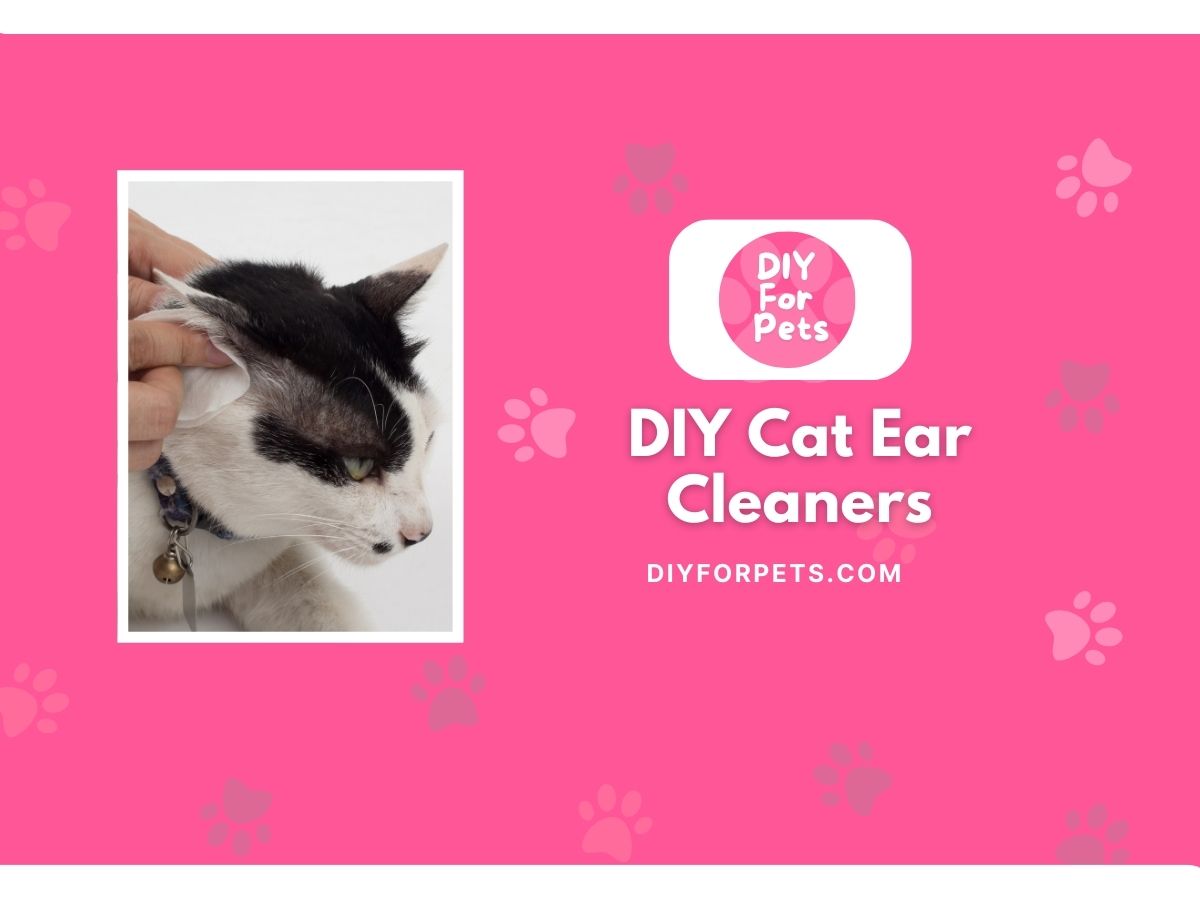5 DIY Cat Ear Cleaners For Easy & Safe Cleaning
Keeping my pets healthy and comfortable is always at the top of my list, and ear cleaning is one small way I can help with that. Our cats are incredibly agile and clean, but even they need a little help with ear care now and then. With a few easy-to-find ingredients and a touch of DIY spirit, we can make a safe, effective ear cleaner that’s gentle and natural for our feline friends. Plus, making it at home allows me to avoid unnecessary chemicals and save a few bucks in the process.
Do Cats Need Ear Cleaners?
Not all cats need regular ear cleaning. For some, their natural grooming routine is enough to keep their ears clean. However, cats with allergies, those prone to wax buildup, or cats who spend time outside might need a bit of extra help. Regular ear checks help catch any signs of dirt, wax, or even potential infections. If you notice any dark debris or unusual odor, it could be a sign of ear mites or an infection, in which case a homemade ear cleaner might come in handy—or, in more serious cases, a vet visit. Clean ears can keep them comfortable and free from itching or irritation, and doing it myself means I can ensure it’s done with gentle, pet-safe ingredients.
DIY Cat Ear Cleaner: Step by Step
Making a DIY cat ear cleaner doesn’t require a lot of fancy ingredients. Here’s a simple step-by-step to create a basic ear cleaner that’s gentle and effective.
Materials Needed
- Distilled water: $1
- Apple cider vinegar or white vinegar: $1–$2
- Coconut oil or olive oil (optional): $2–$3
- Cotton balls or pads: $1–$2
Total cost: Around $4–$6, depending on what you already have.
Phase 1: Prepare the Solution
Mix equal parts of distilled water and vinegar (either apple cider or white vinegar) in a small bottle or container. The vinegar helps with cleaning and balancing pH, while the water dilutes it to make it gentle.
Phase 2: Optional Moisturizing Add-In
If your cat has dry skin around the ears, adding a drop of coconut or olive oil can provide a touch of moisture. This step is optional but can be helpful for cats with sensitive skin.
Phase 3: Application
Soak a cotton ball in the solution and gently wipe the outer parts of your cat’s ear. Be careful not to go too deep, and make sure not to pour any solution directly into their ears.
Easy DIY Cat Ear Cleaner Ideas
Each of these DIY ear cleaners is safe and simple, using natural ingredients to ensure gentle care for your cat’s ears. Here are four different approaches to try, based on what works best for your cat’s needs.
1. Apple Cider Vinegar and Water Solution
This is a classic, easy-to-make ear cleaner that uses apple cider vinegar and distilled water. Mix equal parts of each—about one tablespoon of apple cider vinegar with one tablespoon of distilled water. Dip a cotton ball into the solution, squeeze out the excess, and gently clean around the ear opening. Apple cider vinegar is known for its natural cleansing properties, making it effective against minor bacterial buildup.
This cleaner costs about $1 and is great for regular maintenance. The mild acidity of the vinegar helps to break down wax and clear away dirt, and it’s a go-to for a quick, natural clean.
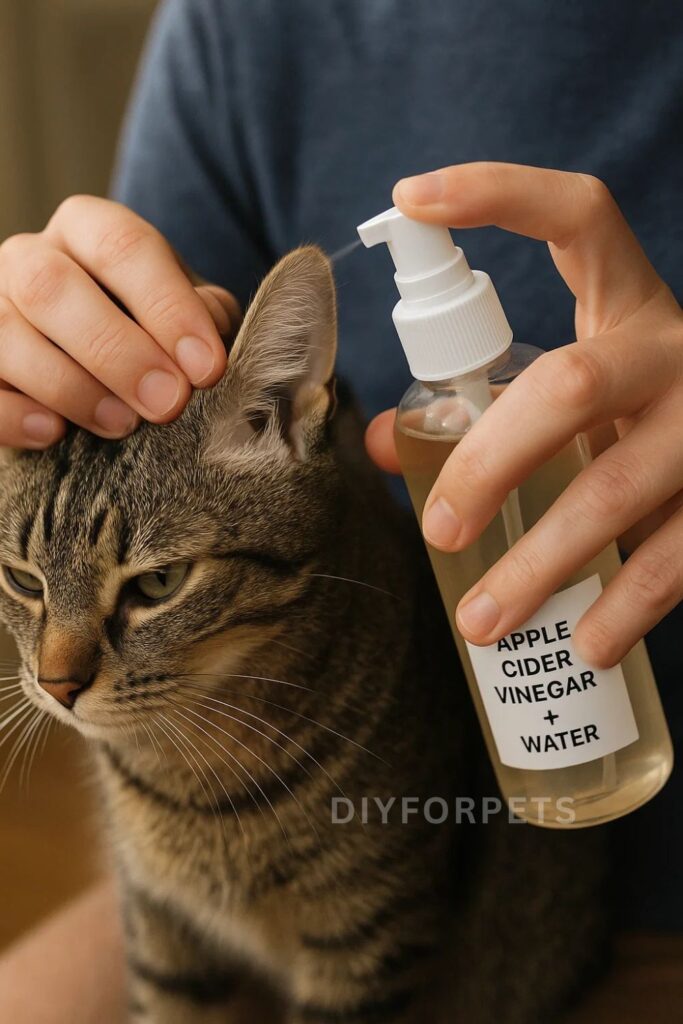
2. Coconut Oil Ear Cleaner
Coconut oil isn’t just good for moisturizing—it has natural antibacterial and antifungal properties that make it a gentle choice for ear cleaning. To prepare, slightly warm a small amount of coconut oil so it’s soft but not hot. Dip a cotton pad into the oil and carefully wipe around your cat’s ear. The oil will help loosen any dirt or wax, making it easier to remove without causing irritation.
This option costs about $2 if you already have coconut oil on hand. It’s especially helpful for cats with dry or sensitive skin, as it’s incredibly soothing and won’t sting.
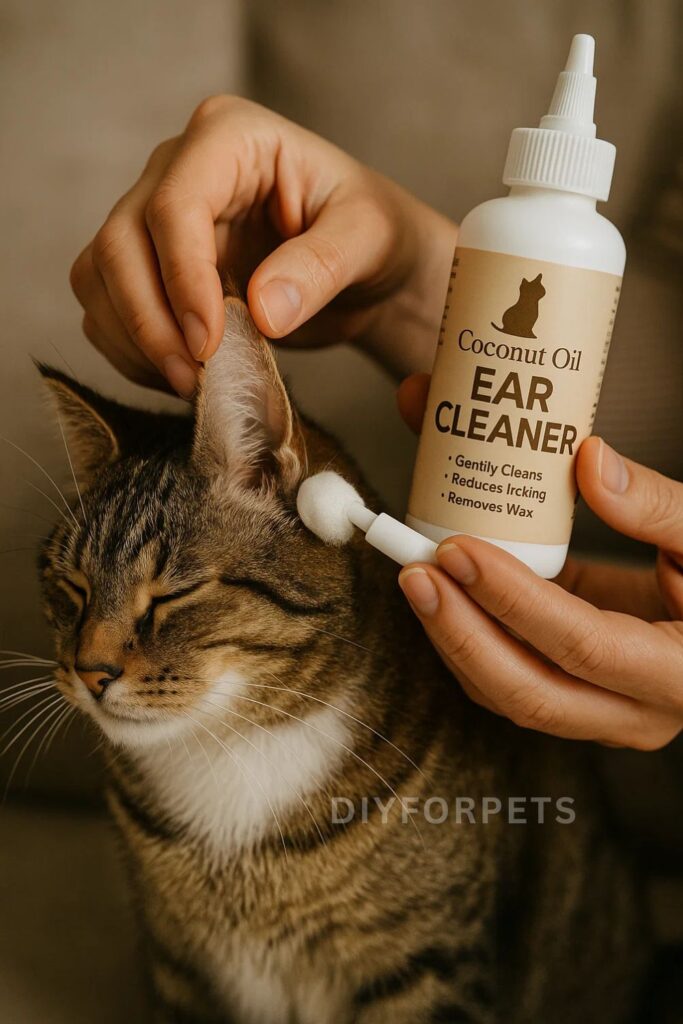
3. Saline Solution
A saline solution is another gentle cleaner that can be used safely for cats. Mix 1 cup of distilled water with ½ teaspoon of salt, stirring until it’s fully dissolved. Use a cotton ball to apply it around the ear area. The salt water helps to cleanse without disrupting the natural balance of the ear, which is perfect for cats that may be sensitive to vinegar or oils.
The cost is about $1, making it an affordable, gentle solution that’s simple to prepare. Saline is mild yet effective at removing dirt and is unlikely to cause any adverse reaction in even the most sensitive cats.
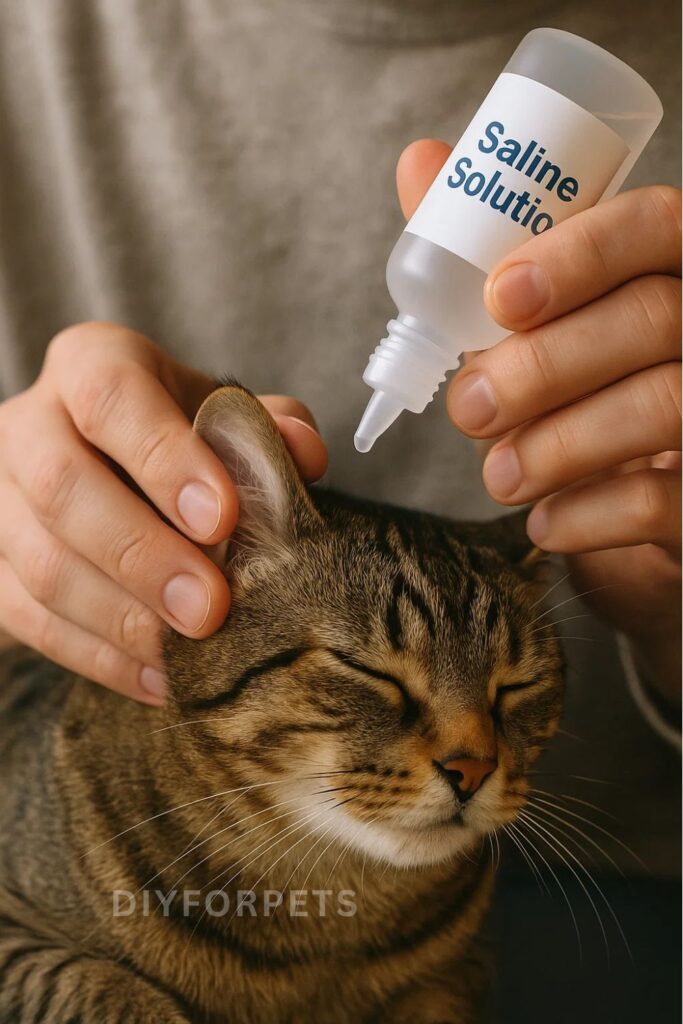
4. Olive Oil and Chamomile Tea Mixture
If you want a more spa-like experience for your cat, try this soothing olive oil and chamomile tea mix. Brew a cup of chamomile tea and let it cool completely, then mix it with a few drops of olive oil. Chamomile is known for its calming properties, while olive oil provides a smooth, moisturizing base. Dip a cotton ball into the mixture and wipe gently around your cat’s ear.
This option costs around $3, and it’s wonderfully calming for both you and your cat. It’s ideal for cats who need a little extra TLC, and the scent of chamomile may help them relax.
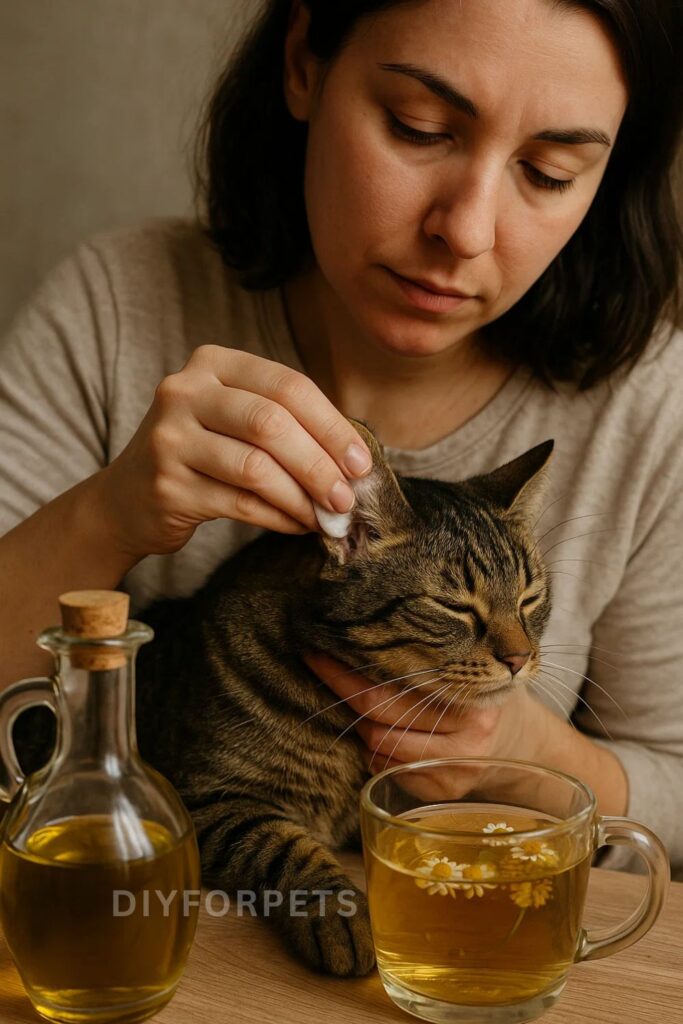
Dos & Don’ts in Cat Ear Cleaners
- Do: Use soft cotton balls or pads for application; they’re gentle and won’t scratch your cat’s ears.
- Do: Be gentle and go slowly, especially if your cat isn’t used to ear cleaning.
- Don’t: Insert anything into the ear canal. Stick to the outer ear to avoid any damage.
- Do: Test any new cleaner on a small area to ensure it doesn’t cause irritation.
- Don’t: Use alcohol or hydrogen peroxide, as these can be too harsh and irritate the sensitive skin in a cat’s ear.
FAQs
1. How often should I clean my cat’s ears?
Once a month is usually enough for most cats, though some may need more frequent cleaning if they have a lot of wax buildup or spend time outdoors.
2. Is it safe to use vinegar in a cat ear cleaner?
Yes, diluted vinegar (apple cider or white) is safe when mixed with water. The dilution helps prevent any stinging sensation while still providing effective cleaning.
3. Can I use a regular cotton swab to clean my cat’s ears?
It’s better to avoid cotton swabs, as they can push wax deeper into the ear canal or accidentally cause injury. Use cotton balls or pads instead.
4. What if my cat resists ear cleaning?
Take it slow and try offering treats or petting during the process. Many cats aren’t fans of ear cleaning, but with a gentle touch and some positive reinforcement, they’ll likely get used to it over time.
Making a DIY cat ear cleaner is one of those small but satisfying ways to care for our pets without any extra fuss or expense. Each of these recipes allows for a gentle, natural clean that keeps their ears healthy and comfortable. Whether it’s a vinegar solution, a coconut oil treatment, or a calming chamomile mix, these homemade ear cleaners are safe, effective, and a wonderful addition to your pet care routine.

